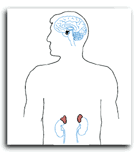 | Addison Disease Adrenal Failure |
| Addison's disease is an endocrine or hormonal disorder that occurs in all age groups and afflicts men and women equally. The disease is characterized by weight loss, muscle weakness, fatigue, low blood pressure, and sometimes darkening of the skin in both exposed and nonexposed parts of the body. Addison's disease occurs when the adrenal glands do not produce enough of the hormone cortisol and, in some cases, the hormone aldosterone. The disease is also called adrenal insufficiency, or hypocortisolism.
Cortisol Cortisol is normally produced by the adrenal glands, located just above the kidneys. It belongs to a class of hormones called glucocorticoids, which affect almost every organ and tissue in the body. Scientists think that cortisol has possibly hundreds of effects in the body. Cortisol's most important job is to help the body respond to stress. Among its other vital tasks, cortisol
Because cortisol is so vital to health, the amount of cortisol produced by the adrenals is precisely balanced. Like many other hormones, cortisol is regulated by the brain's hypothalamus and the pituitary gland, a bean-sized organ at the base of the brain. First, the hypothalamus sends "releasing hormones" to the pituitary gland. The pituitary responds by secreting hormones that regulate growth and thyroid and adrenal function, and sex hormones such as estrogen and testosterone. One of the pituitary's main functions is to secrete ACTH (adrenocorticotropin), a hormone that stimulates the adrenal glands. When the adrenals receive the pituitary's signal in the form of ACTH, they respond by producing cortisol. Completing the cycle, cortisol then signals the pituitary to lower secretion of ACTH. Aldosterone Aldosterone belongs to a class of hormones called mineralocorticoids, also produced by the adrenal glands. It helps maintain blood pressure and water and salt balance in the body by helping the kidney retain sodium and excrete potassium. When aldosterone production falls too low, the kidneys are not able to regulate salt and water balance, causing blood volume and blood pressure to drop. |
continue to Adrenal Insufficiency
.